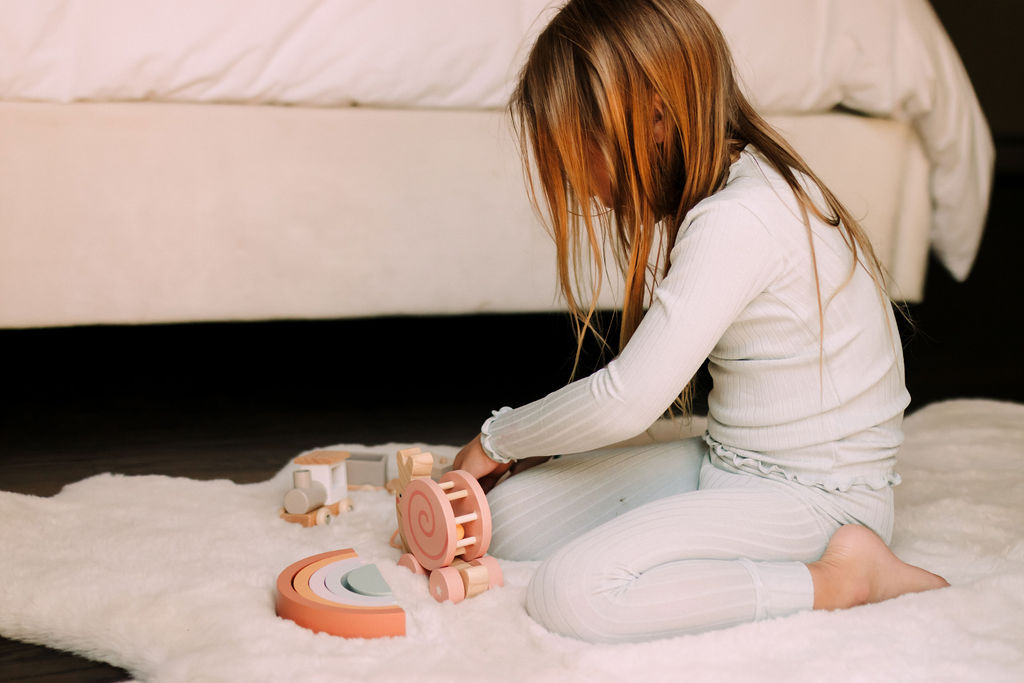If your toddler or preschooler is suddenly waking more at night, it’s easy to assume it’s a phase or another *sleep regression*.
But when no obvious cause stands out, and your child seems restless, uncomfortable, maybe even scratching or complaining that something is hurting, there’s another possibility that you may not have thought of: pinworms.
While it’s not the most common cause of sleep issues, it’s not rare either – and it’s often overlooked.
What are pinworms?
Pinworms are small, white, thread-like parasites that live in the human large intestine. At night, the adult female worm exits the anus to lay her eggs on the surrounding skin, which causes itching and restlessness – especially during the night hours.
Pinworms don’t cause serious health problems in most cases, but they can absolutely wreck your child’s sleep until they’re treated.
How do kids get pinworms?
Pinworm eggs spread through the fecal-oral route – which is exactly as unglamorous as it sounds. Here’s how it often happens:
- A child scratches their bum (often in their sleep), and microscopic eggs get stuck under their fingernails.
- Later, they touch their mouth, food, toys, or someone else’s hand – spreading the eggs around.
- Another child touches the same toy or surface and then puts their fingers in their mouth – and the cycle continues.
Eggs can survive on bedding, clothing and toys for up to 2–3 weeks. They’re invisible to the eye and basically impossible to find when you’re cleaning.
Why does no one talk about this?
No one likes to talk about pinworms, because it’s kinda… embarrassing. They’re a little gross.
There’s a weird kind of shame attached to pinworms, like they imply your home isn’t clean or your kid’s hygiene isn’t up to par. But I want you to know that simply isn’t true. Pinworms are extremely common among young children, and while I get why you don’t want to share this on your Instagram page, there is absolutely nothing to be ashamed about if your child has pinworms.
Children who bathe daily and live in clean homes get pinworms. Preschoolers share everything with each other, including pinworms. It’s not a reflection on your hygiene or your parenting – it’s the reality of life with little kids.
Pinworms are the most common parasitic infection in the United States, especially in school-age children. Estimates suggest that 10–30% of children contract pinworms at some point – and the numbers are higher in group settings like preschool or daycare.
If your child is in regular contact with other kids, the odds of exposure are pretty high.
How pinworms affect sleep
This is where parents usually notice something is off – well before they know it’s pinworms.
Pinworms are nocturnal, meaning they’re most active after your child is asleep. That’s when the female worm lays her eggs, and the itching begins.
Common sleep-related symptoms:
- Sudden night waking after bedtime
- Scratching or squirming in bed
- Restless sleep, whining, or irritability
- Difficulty falling back asleep
- Regressions that don’t respond to your usual soothing
- Teeth-grinding during sleep
If your child seems agitated or uncomfortable at night, but fine during the day, it might be time to check for pinworms.
When to look for pinworms
If you see
- Intense itching around the anus or genitals (especially at night)
- New or increased nail-biting, thumb-sucking, or teeth grinding
- Night wakings that are frequent, sudden, and hard to soothe
- Reports of “tickling,” “wiggling,” or “something in my undies”
Some kids might not mention discomfort, especially if they can’t describe the sensation well. On the other hand, some kids can describe it really well, as seen in this dm I got from a mom after I suggested she check for pinworms:

How to check for pinworms
There are two ways you can check your child for pinworms. They’re not fun, so buckle up: no one said parenting was easy, my friend.
1. Flashlight Check:
In the late evening or early morning hours, use a flashlight to examine the area around the anus. You may be able to spot very small, white, thread-like worms moving on the surface of the skin.
2. Tape Test:
First thing in the morning – before your child uses the bathroom – press a piece of clear adhesive tape to the skin around the anus. Place the tape in a sealed plastic bag and bring it to your pediatrician to check – or see if you can spot them yourself. This method helps detect pinworm eggs.
Don’t be surprised if your pediatrician skips testing and offers to treat your child for pinworms based on symptoms alone.
Medical treatments for pinworms
Doctors typically prescribe:
- Mebendazole (Vermox)
- Pyrantel pamoate (Reese’s Pinworm Medicine – available here)
- PinRid chewable pinworm medicine (available here)
- ParaGuard Liquid Drops (available here)
These medications kill adult worms – but not the eggs. A second dose is always recommended two weeks later to kill any worms that hatched after the first treatment.
Many pediatricians recommend treating the entire household at once, even if only one child is symptomatic.
Natural and homeopathic remedies
Some options to explore:
- Garlic paste around the anus: may help deter egg-laying
- Pumpkin seeds and papaya seeds: believed to have natural anti-parasitic properties
- Wormwood tincture or tea: a classic herbal remedy for intestinal parasites – available here
- Homeopathic Cina or Spigelia: often used for restlessness, anal itching, and irritable sleep in children
Always consult your child’s pediatrician or an experienced practitioner when exploring natural remedies, especially for toddlers or younger.
Hygiene protocol for pinworms
To break the cycle:
- Treat all family members at the same time
- Clip nails extremely short and scrub under them daily
- Supervise frequent handwashing—soap and hot water are a must!
- Shower every morning to remove overnight eggs
- Wash pajamas, underwear, bedding, and towels daily in hot water
- Clean toilet handles, light switches, doorknobs, and high-touch surfaces daily
- Don’t bathe siblings together during this time to avoid cross-contamination
Important: Eggs hatch and grow under the fingernails—this is why short nails and frequent handwashing are critical during treatment and for a few weeks after.
It takes effort, but 2–3 weeks of vigilance is often enough to fully break the cycle and prevent reinfection.
If your kids is suddenly waking up itchy and miserable at night, don’t rule out pinworms. It’s way more common than you might think – and with the right treatment and some solid hygiene habits, you can kick ’em to the curb.
And once that itch is gone… everyone sleeps better.








Comments +